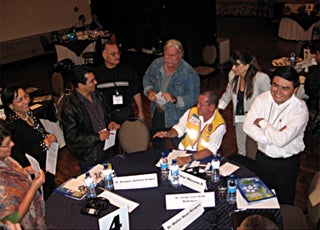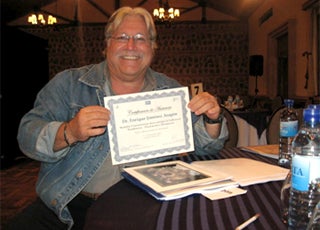

A sub-regional workshop organized by PAHO and the CDC focused on public health interventions to mitigate the effects of the 2009 H1N1 influenza at the community level. Schools, workplaces, healthcare facilities, local government agencies, faith-based organizations, and others play an important role in promoting health before, during, and after a pandemic.
PAHO/CDC Workshop on Community Preparedness and Response on Influenza
The Pan American Health Organization and the Centers for Disease Control and Prevention organized a sub-regional workshop on community preparedness and response for influenza. The workshop, held in Guatemala from November 9th-10th 2009, focused on public health interventions to mitigate the health effects of the 2009 H1N1 influenza at the community level. Schools, workplaces, healthcare facilities, local government agencies, faith-based organizations, and civil societies play an important role in promoting the health of their community members prior, during, and after a pandemic.
 Photo by Marie-Claude Lavoie (PAHO/WHO)
Photo by Marie-Claude Lavoie (PAHO/WHO)Overall, 30 persons from Honduras, Costa Rica, El Salvador, Guatemala, and Panama participated in the capacity building training. The attendees represented various key stakeholders who are central to leading, planning and implementing mitigation strategies to prevent the spread of influenza at the local level. During the meeting, representatives from the Ministry of Health, Ministry of Labor, healthcare facilities, academic institutions, and civil societies discussed their roles and responsibilities in the face of a pandemic. The participants also shared and highlighted some of their challenges with the 2009 H1N1 pandemic. For example, participants stressed difficulties related to providing timely and coordinated messages to the population in times of a public health crisis. The countries' experience with H1N1 demonstrates the critical importance of preparing and coordinating pandemic plans, as time is short once a pandemic emerges.
 Photo by Marie-Claude Lavoie (PAHO/WHO)
Photo by Marie-Claude Lavoie (PAHO/WHO)The training also engaged participants in sessions that provided information on the status of the pandemic, monitoring of respiratory diseases, community mitigation strategies, and roles and responsibilities of different local stakeholders during the pandemic. In addition, participants received tools and resources, such as guidelines, to aid in strengthening their programs. One of the tools presented was the new PAHO online course on Occupational Health and Infection Control Measures, available on PAHO Workers' Health website. This online module is an interactive training toolkit for healthcare workers to refine their knowledge on how to prevent and control the transmission of influenza. Health workers are at high exposure risk for pandemic influenza. In fact, studies reveal that during the regular influenza season, approximately 23% of healthcare workers develop influenza-like symptoms. Environmental controls and training for health workers on how to protect themselves is a vital component to limit the spread of influenza.
Following the workshop, CDC invited all participants to submit grant proposals to implement community mitigation interventions. PAHO and CDC will collaborate to provide technical support on the proposed project.
For more information, please contact Marie-Claude Lavoie from the Sustainable Development and Environmental health Area at the Pan American Health Organization in Washington, D.C.

 A sub-regional workshop organized by PAHO and the CDC focused on public health interventions to mitigate the effects of the 2009 H1N1 influenza at the community level. Schools, workplaces, healthcare facilities, local government agencies, faith-based organizations, and others play an important role in promoting health before, during, and after a pandemic.
A sub-regional workshop organized by PAHO and the CDC focused on public health interventions to mitigate the effects of the 2009 H1N1 influenza at the community level. Schools, workplaces, healthcare facilities, local government agencies, faith-based organizations, and others play an important role in promoting health before, during, and after a pandemic.





